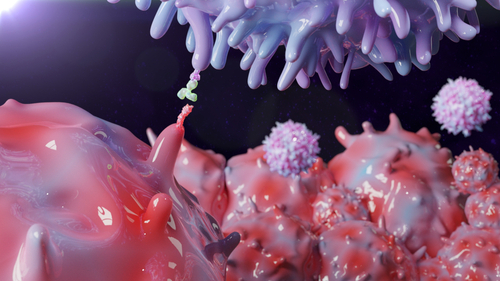
Immune evasion (IE) alterations impact the duration of response to checkpoint inhibitors (CPIs) in patients with metastatic non-small cell lung cancer (NSCLC), according to a study presented at the European Society for Medical Oncology Congress 2023.
“[CPIs] improve survival of patients with metastatic [NSCLC]. However, in many patients the duration of response is limited, and some patients derive no benefit at all,” researchers said. “Among key determinants of CPI response are genomic alterations that impair the antitumor immune response,” they noted. While these gene alterations are common in primary NSCLC, less is known about the prevalence and distribution of the alterations in metastatic disease, largely due to the challenges of collecting metastasis samples. It is also unclear how this challenge impacts response to CPIs.
In their analysis, researchers analyzed the PEACE autopsy study in tandem with the TRACERx study, which enabled multiregion tumor sampling from the time of NSCLC diagnosis to death, “allowing immune evasive capacity to be tracked across space and time.” The investigators performed exome sequencing on 84 primary tumor regions and 320 metastases from 21 patients. The neoantigen landscape and genomic alterations in genes involved in IE alterations were then characterized in each tumor clone.
The study found that IE alterations are frequent in metastases and emerge via distinct evolutionary paths. Specifically, the analysis showed that IE primary tumor clones seed metastases, then give way to metastases with poor T-cell infiltration that share IE alterations with the primary tumor. However, some primary tumor seeding clones do not harbor IE alterations, the researchers noted. “Compared [with] patients with shared IE alterations, these patients’ metastases have higher T-cell infiltrate and acquire more metastasis-unique IE alterations after seeding.” In patients with metastatic NSCLC treated with CPIs, there was homogenous progression of metastases in patients with shared IE alterations, while patients with metastasis-unique IE alterations exhibited heterogeneous metastasis growth rates.
“When IE alterations occur in relation to metastatic seeding dictates the distribution of immune-evasive capacity across metastases, which impacts metastasis growth during CPI therapy,” the researchers concluded.







 © 2025 Mashup Media, LLC, a Formedics Property. All Rights Reserved.
© 2025 Mashup Media, LLC, a Formedics Property. All Rights Reserved.